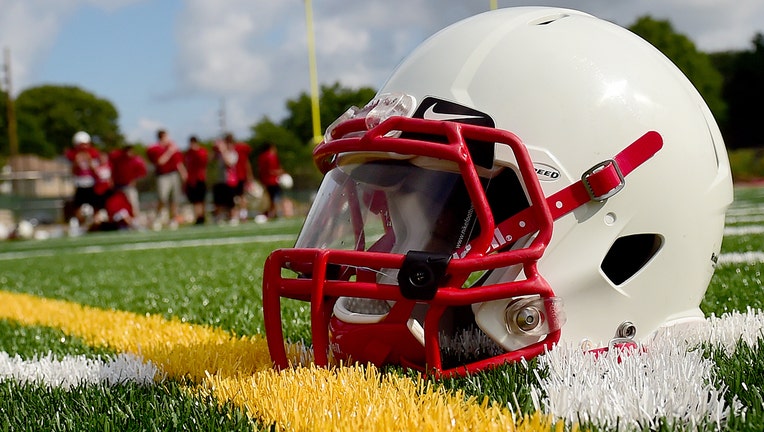Kids who play team sports are less likely to have mental health issues, study suggests

A football helmet lies on the ground while members of the Floral Park High School football team are in the background practicing for the 2015 season, on the morning of August 19, 2015.(Photo by Thomas A. Ferrara/Newsday via Getty Images)
A new study exploring the association between a child's participation in an organized sport and their mental health found that those who participate in team sports may be less likely to have mental health difficulties.
According to the study, published in PLOS One, researchers used data from more than 11,000 U.S. children between the ages of 9 and 13 years old.
Parents and guardians provided self-reports of their child’s mental health difficulties using a "child behavior checklist." In addition, they were provided with a lengthy list of activities (sports, music, hobbies) and were asked to indicate their child’s lifetime involvement in each.
Researchers found that participation in a team sport compared to non-sport participation was associated with 10% lower anxious/depressed scores, 19% lower withdrawn/depressed scores, 17% lower social problems scores, 17% lower thought problems scores and 12% lower attention problems scores.
Conversely, participation in an individual sport compared to non-sport participation was associated with 16% higher anxious/depressed scores, 14% higher withdrawn/depressed scores, 12% higher social problems scores and 14% higher attention problems scores.
"It is possible that some children and adolescents who compete in individual sports experience significant stress associated with performing independently, which could contribute to mental health problems," the study’s authors explained.
In addition, athletes who played both a team and individual sport did not have different mental health profiles compared to non-sport playing children and adolescents.
"Results indicate that team sport participation was associated with fewer mental health difficulties, whereas individual sport participation was associated with greater mental health difficulties," the study’s authors continued. "The results suggest that [the] type of sport may be a salient factor in the relationship between sport participation and mental health."
Overall, there were fewer mental health difficulties among females compared to males, and among those who identified as Black and Asian compared to those who identified as White.
"The results of this study, coupled with previous research findings, suggest that participation in organized team sport may be a useful medium through which to promote child and adolescent mental health," the authors added. "Efforts to provide children and adolescents with affordable options to join organized team sport leagues/clubs outside of school may require further attention, particularly for families with socioeconomic challenges."
A potential limitation the researchers noted was its use of parent self-reports, noting that it is possible that parents who enroll their children in individual sports tend to overestimate the problematic aspects of their children’s emotional and behavioral conduct. Alternatively, they said it is also plausible that parents who register their children in team sports are more likely to view their children interacting positively with peers and thus tend to underestimate any potential mental health difficulties.
Researchers said additional research will be needed to determine to what extent, and under what circumstances, participation in an individual sport may be problematic for adolescents.
Additionally, the authors said future studies could be done to examine the link between sport participation and mental health among minority youth populations (such as LGBTQ adolescents) who may be at an increased risk for mental health difficulties.
These findings do complement previous research suggesting that team sport participation may be a vehicle to support child and adolescent mental health. But other studies have also linked youth sport participation with adverse outcomes such as anxiety and burnout.
RELATED: Focusing on 1 sport can have both positive and negative outcomes in teens, study finds
In a recent study, published last month in the Orthopaedic Journal of Sports Medicine, researchers surveyed 975 U.S. high school athletes and found two dimensions of competitiveness — the enjoyment of competition which has been associated with intrinsic sport motivation and good sportsmanship, along with contentious competitiveness which has been associated with extrinsic sport motivation and poor sportsmanship.


